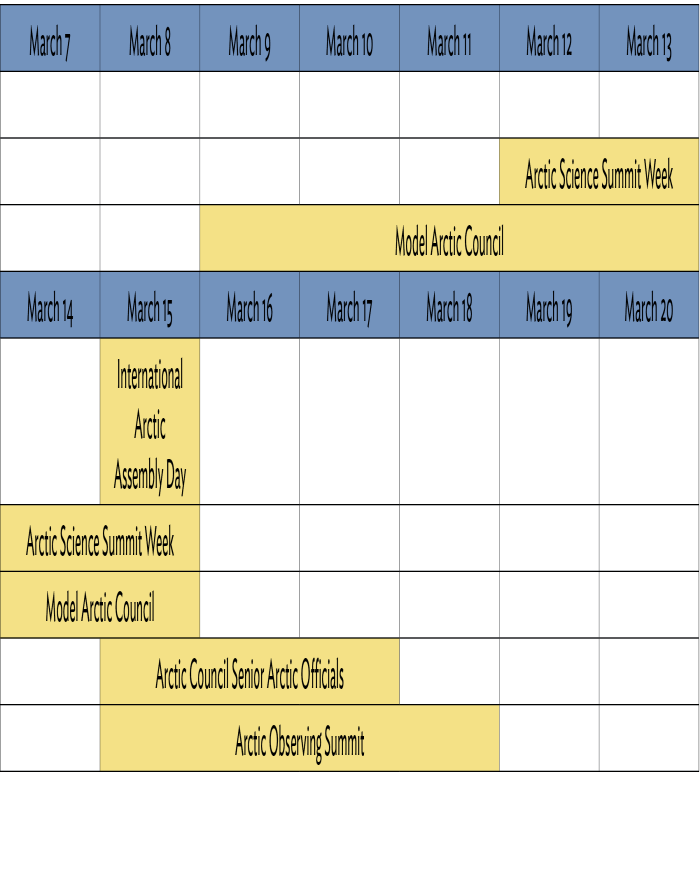By: Kristin Timm, Science Communications Lead, Scenarios Network for Alaska and Arctic Planning, Alaska Climate Science Center, University of Alaska Fairbanks

Early morning teleconferences and discussions bursting with ideas have become routine to teams distributed over several continents as they work to develop the program for the 2016 Arctic Science Summit Week (ASSW), Arctic Observing Summit (AOS), and related side meetings and events that will convene 9-20 March 2016 in Fairbanks, Alaska.
Nearly 1,000 scientists, policy makers, technical experts, educators, and other Arctic authorities from around the world will gather during these meetings to develop a better understanding of the Arctic environment and its role in global policy.
"I am delighted with the excitement and enthusiasm that we see at Alaska's universities and throughout the state of Alaska," said Larry Hinzman, Interim Vice Chancellor for Research at the University of Alaska Fairbanks (UAF). "The people of Alaska look forward to welcoming conference participants to Fairbanks."
Central to the event is the annual Arctic Science Summit Week. Coordinated by the International Arctic Science Committee (IASC), ASSW brings scientific organizations from around the world together to coordinate activities and look for opportunities to cooperate and collaborate.
"The National Academies' Polar Research Board (PRB) will convene a joint meeting amongst the U.S. Arctic Research Commission, the European Polar Board, and Polar Knowledge Canada to advance discussions on international cooperation in Arctic studies," explained Volker Rachold, Executive Secretary of IASC. "They have taken a proactive stance in promoting international collaborations."
In addition to working group and business meetings, ASSW will also include discussions about crosscutting initiatives, such as a seminar to discuss communication and collaboration between the humanities, social sciences, and natural sciences.
The Arctic Observing Summit meets biennially to provide guidance and foster collaboration on sustained, coordinated observations of rapid Arctic change that can benefit all nations. Led by the International Study of Arctic Change (ISAC) and co-sponsored by IASC and the Arctic Council's Sustaining Arctic Observation Networks Initiative, the third AOS will bring together the research community and a range of partners to advance the implementation of an international observing network.
AOS working groups will convene to address themes that include diverse subjects from technology and innovation for sustained Arctic observations to actor and stakeholder engagement and needs.
"The working groups include coordinators of international research initiatives, funding agency leaders, Indigenous Knowledge experts, and industry representatives, which speaks to the diversity, relevance, and interest in the Summit's topics," explains Hajo Eicken, Interim Director of the International Arctic Research Center and one of the co-chairs of AOS. "The white papers submitted by the international community will lead to important conversations within the working groups."
The University of Alaska Fairbanks is also hosting a meeting of the Arctic Council's Senior Arctic Officials. The meeting is part of the Arctic Council's aim to foster cooperation on issues of mutual concern. It will include updates on associated working groups such as those on Sustainable Development and Emergency Prevention, Preparedness, and Response.
These large meetings will be held simultaneously to promote communication. To that end, UAF is coordinating a special program for all participants on 15 March. The International Arctic Assembly will be an unprecedented opportunity to explore the role of science in both understanding the Arctic system and implementing policy to respond to rapid change.

UAF is also developing a program for students and the Fairbanks community. One of these activities is the Model Arctic Council (MAC), an experiential learning exercise where students simulate the work of the Arctic Council. Brandon Boylan, co-chair of the MAC explained, "The program will include simulations of meetings of the Arctic Council Sustainable Development Working Group, Senior Arctic Officials, and Ministers. Students will also have the unique opportunity to hear from high-profile experts and policy makers on Arctic affairs."
Alaska's presence in the Arctic is the reason the United States is an Arctic nation and why UAF is working to guide the local, national, and international dialogue on the challenges and opportunities unique to the Arctic. UAF research is diverse and encompasses most of the sectors, disciplines, and problem areas that matter in the context of rapid Arctic change. By hosting the Summit, related meetings, and community events, UAF is striving to bring together diverse perspectives during the 2016 Arctic Science Summit Week and related events.
More information about the Summit, online registration, and the developing program is available here.
